Most of the recipients of child support and other alimony payments do not like the situation where the payer is trying to reduce the amount of the payments, which is clear: no one wishes to receive less money than was previously paid.
The Family Code allows for a claim for a reduction in maintenance to be brought before a court; in order for the recipient of the funds to have any influence on the judgement in the case, he must prepare an objection to the claim for a reduction in the amount of maintenance.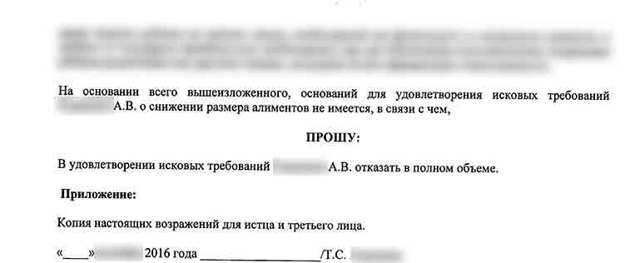
What is an objection to an action, how it is properly prepared and filed, in this article.
What is an objection?
In a broad sense, an objection can be understood to mean any document which is intended to prevent the payer of maintenance from obtaining satisfaction of the claim for reduction of maintenance.
It is not important, for example, in a first-instance process or on appeal.
In a broad sense, even an appeal can be considered an objection.
The maintenance worker may also make an objection; for example, in the exercise of procedural rights, it is permissible to raise an objection to an action for maintenance.
Still, an objection to a claim for change of payments, such as children, has traditionally been interpreted narrowly as a claim or a respondent ' s withdrawal of the plaintiff ' s application.
Form of document
Like any application made in the course of a trial, the defendant has the right to withdraw at any stage of the proceedings before the judgement is pronounced.
If applications can also be made orally, the objection must be made in writing, handwritten or computer-assisted.
What is the structure of this document?
The following particulars should be indicated in the cap:
- The court to which the paper is submitted;
- Who is the plaintiff in the case and who is the defendant, where the parties reside;
- Number of case under consideration.
An objection to a claim for reduction of payments made in the course of a trial should include such information as:
- Who, and when, went to court on what matter;
- A brief description of the nature of the claims and their justification;
- Information on why the respondent does not agree that the grounds stated by the claimant should facilitate the satisfaction of the claim;
- References to the law governing the disputed situation and confirming the defendant ' s position;
- The content of the defendant's claims.
What can the defendant ask if he wishes to object to the plaintiff in the case?
The withdrawal submitted to the court must be accompanied by copies of the documents on which the defendant bases his position, and the number of copies must be sufficient for all.
Where do you get a sample?
It is, in principle, easy to fill in a form, but in order to object to a claim, one must understand what is wrong with the applicant, and it is necessary to have the legal knowledge to do so, so it is advisable to seek the assistance of a legal expert who can:

- A competent understanding of the situation;
- Select strong arguments;
- They are well-founded;
- At the client's request, prepare the withdrawal by hand.
In general, maintenance relationships are broad enough: first, the right to payment may not only arise for children; second, a wife, ex-wife, grandson, grandfather, disabled parents and even brother and sister may apply for alimony; secondly, the grounds for the objection depend on the basis of the claim.
For example, if a father who is ill and spends a large amount of money on medicines is responsible for reducing the amount of payment, it is necessary to find out how serious the disease is, how it affects ability to work.
However, the reasons for the reduction should be discussed in more detail.
Arguments and counterarguments
The legislator does not specifically state on what grounds the amount of maintenance payments can be reduced, but some of them may be described in the analysis of case law:
- The financial security of the payer has declined significantly, as can be seen from the following point of view: In accordance with the provisions of the UK, even the lack of income is not a valid reason for the non-payment of maintenance.
- The payer ' s earnings have increased to such an extent that he thinks that the contributions in favour of his son or daughter are excessive; the defendant may refer, again, to the obligation of the parent to support the child, and the percentage to be withheld from the income is set in the UK of the Russian Federation.
- A maintenance worker is seriously ill and, as noted in the above example, it is necessary to determine how serious the disease is, how it affects the ability to work, how much money is spent on treatment.
- A child earns income, for example, by working under a contract of employment. What is the level of income and what is its essence? For example, if a child becomes an entrepreneur at the age of 16, it is one thing; if he receives a benefit from the state, it is another.
- The minor has expensive property, and the objection will be: the property is not used for profit, so this fact is irrelevant.

There may be other grounds, but it has been noted that the content of the statement of claim is necessary.
For example, if a claim has previously been filed to recover maintenance in a firm amount, the payer ' s right to reduce payments can be recognized, but it is not accepted to calculate them.
If you have a claim for maintenance damages, you must know that the law also gives you the right to reduce the amount of the debt.
It is also worth noting that an objection to an action may be made in the form of a counter-claim, which may be filed if:
- The requirements are interrelated;
- Their joint consideration would be effective.
For example, the child ' s father demands a reduction in maintenance payments, and the mother, in turn, makes a counter-claim and demands an increase in retention payments.
Objection before higher courts
If the amount of maintenance has been reduced in hard cash or in percentage terms, it is not the fact that this will be the end of the day, and the court ' s decision may be appealed:
- On appeal, in the District Court;
- In cassation, in the regional court;
- In the Supreme Court, under the supervisory review procedure.
At these stages, an objection is raised not only to the claims but also to the judicial act to which the claims are granted.
The procedure for appealing to the second and subsequent courts is such that the beneficiary of maintenance has the right to lodge an objection to the appeal or other appeal on alimony if the essence of the act complained of is not satisfactory to the payer of the money.
The court of first instance, for example, had been seized of a dispute concerning the reduction of the child ' s benefits.
In the claim, the alimony worker was denied – he failed to prove that a reduction in monthly payments was possible.
The payer, in disagreement with the decision, prepared the complaint and filed it with a higher court, while the recipient raised objections to the complaint on the form referred to above.
Maintenance claims and defences
In general, a withdrawal or appeal may be lodged in respect of any dispute relating to maintenance payments, such as an objection to a claim for maintenance of a spouse.
Moreover, the law of the UK of the Russian Federation sets out the specific grounds on which a court may refuse an action in this case, in particular if the spouse's incapacity to work is the result of his or her alcohol addiction.
In each particular case, the UK of the Russian Federation should be carefully read and the necessary basis should be sought, which may be mentioned in the withdrawal of the case.
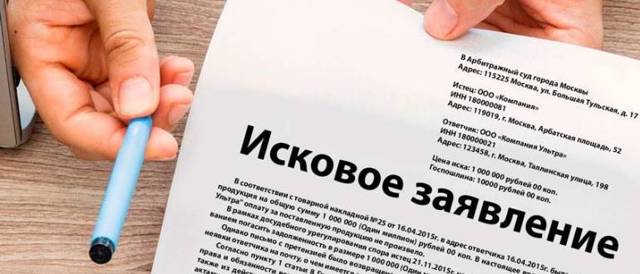
The debtor may not be able to review the proceedings in the course of the order proceedings, and that is how minors should be recovered for their share of the parent ' s income.
- The applicant shall file an application with the relevant documents attached to it with the court.
- The court shall, within five days, hear the application without calling the parties to the proceedings and issue an order.
- A copy of the order is sent to the parties.
The debtor of the case has 10 days from the date of receipt of the documents to file an application for annulment with the judicial authority.It should set out his position and the arguments on which he believed that the act should be repealed, which was also, in general terms, an objection to maintenance.
It doesn't matter that their payer doesn't have the capacity to counter the demands of the recipient in the courtroom, the important thing is that there's an opportunity to express its disagreement with the claim.
Moreover, if the withdrawal in the proceedings is not always taken into account, the requirement to quash the order is always met.
Formulation of an objection to an action for reduction of maintenance
Many of the fathers try in every way to reduce the amount of money paid to the child; often there is a situation of concealment and underestimation of their income, working with "grey" wages, and the payer can sue for a reduction in the amount of maintenance paid.
An objection to a claim for a reduction in maintenance should be the primary means for the mother to maintain her children at the same level. How is it correct to draw up such objections when they are raised, what documents are attached - these and other issues will be dealt with in this article.
Possible reduction of maintenance
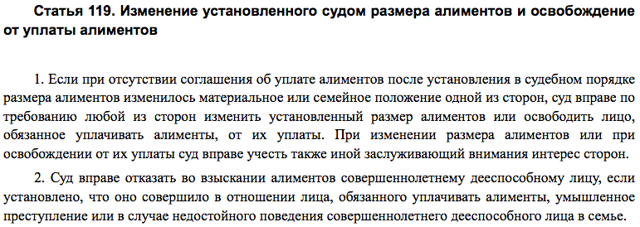 Article 119 of the Family Code
Article 119 of the Family Code
The law allows for changes in the amount of maintenance to be recovered, both in terms of reduction and increase, when the parties have changed financially as well as in their marital situation; the court may also take into account other significant circumstances that have arisen in the life of the payer or the recipient of the money (article 119 of the Family Code of the Russian Federation).
The amount of maintenance may be reduced if it is recovered from the debtor by a court order, but if the payment of the money is based on a voluntary agreement, the procedure cannot be applied.
Procedure for the reduction of maintenance
If the payer has decided, through the court, to reduce the amount of money paid for the maintenance of his children, he will file a complaint with the Magistrate ' s Court, which may only be filed in the defendant ' s place of residence, i.e. the mother of his child.
The claim contains arguments that the plaintiff considers to be grounds for reducing the amount of maintenance and provides evidence to substantiate his case.
The court sends the summons as well as the application with copies of the documents attached to it to the applicant for maintenance, and after receiving them and consulting them, it is necessary to start preparing objections to the application.
Objections to the statement of claim are counter-arguments put forward by the respondent to the arguments set forth in the statement of claim with evidence.
The Code of Civil Procedure of the Russian Federation does not contain any strict requirements for the form of such objections, thus allowing for both oral ghosts of objections to an action and their writing.
If there is no time to write objections, they may be presented orally during the court hearing in the case, when the court will give the word to the defendant, all of which must be recorded in the record of the proceedings.
The protocol can then be consulted if it is incomplete or incorrect, it is necessary to write comments and submit them to the court.
It is, of course, better to state your position on the case in writing, with subsequent admission to the case file; objections may be made in both handwritten and printed form.
After they have been presented to the court orally, a request for objections to the case file must be made, after which a copy must be handed over to the court; a copy must also be prepared for the plaintiff; thus, three copies of the document must be provided.
Model objection
The following general advice can be given in the form of a statement of objections.
The document should indicate:
- Name of the justice of the peace, station number;
- Case number (if known, should be indicated in the summons);
- F.I.O. plaintiff and defendant;
- Title of the document (Objects to the statement of claim);
- The main arguments against the defendant ' s claims to reduce child maintenance payments;
- Requests for evidence (if necessary);
- Refusal of action;
- List of attached documents.
This is a general, schematical, model of the objection on which a document can be drawn up, and its specific content will depend on the basis of the requirement to reduce the amount of maintenance.
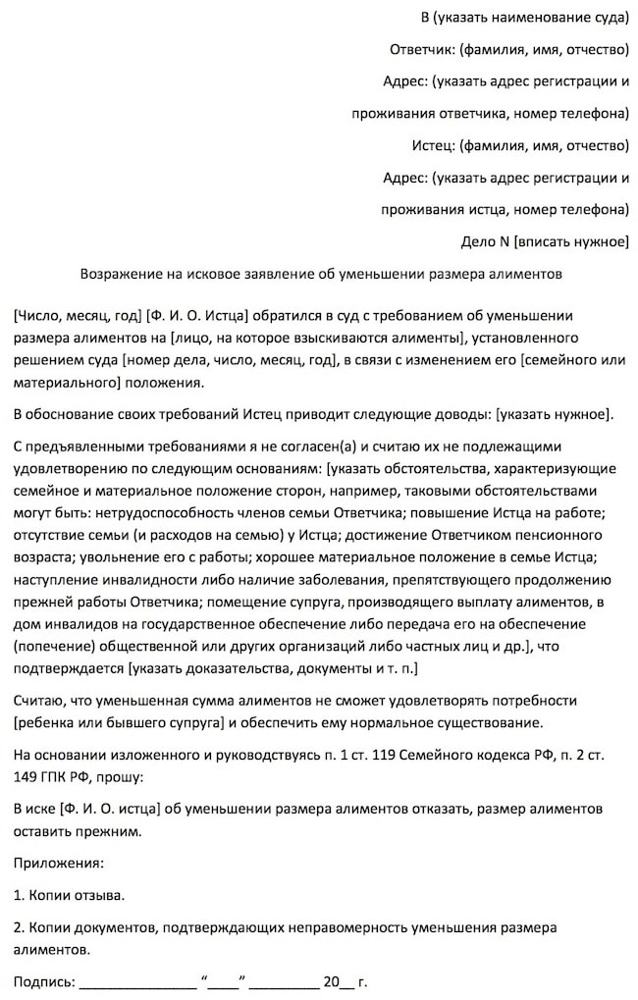
The content of the defences to the claim
Consider the most common reasons that support workers have for reducing the amount of money given to their children, as well as the recommendations that mothers may have on a case-by-case basis.
Birth of other children

Fathers most often believe that, when they are born in a new marriage, they have the right to claim a reduction in their earnings from 1/4 to 1/6, citing article 81 of the Family Code of the Russian Federation.
The mere fact of having children will not force the court to reduce payments previously awarded if the father ' s income remains at the same level.
It's necessary to find out if the place of employment of the maintenance worker has changed, his salary, how long he's been working, and it won't be possible to obtain such documents on his own, so you have to ask the court to claim them.
In addition, fathers and their new spouses sometimes artificially create a situation of recovery of maintenance for a second child.
At the same time, the new spouse applies for the recovery of money and receives an executive document.
We need to try to find out if their marriage has been dissolved, whether they continue to live together and raise their child together, whether the document is enforced.
Example of arguments for objections
The complainant ' s place of work has not changed, his earnings have not decreased significantly, he works in one place for a long time and has a permanent income, i.e. his financial situation has not deteriorated.
The plaintiff ' s claim that he is also obliged to pay money for the maintenance of a second child by order of a court is not valid, as he continues to live at the same address as his wife and child, and no court order has been issued to the bailiffs for execution.
Change of place of work
In many cases, fathers, in an attempt to reduce the amount of maintenance recovered in a fixed amount, are dismissed from their previous job, starting with a much lower salary, and may do the same if the court refused to reduce the maintenance on the birth of a second child, indicating that the financial situation did not deteriorate.
They would be reduced only if the plaintiff could prove that his financial situation had deteriorated significantly and thus prevented him from paying maintenance at the same level.
It is necessary to find out why the dismissal took place. If so, please indicate that the father deliberately made his financial situation worse.
It is important to examine how much a father receives his salary, whether it allows him to pay the child the same amount, and it is also important to provide arguments on how a reduction in the child ' s living conditions will affect the child ' s living conditions.
After all, a healthy, capable father has every opportunity to engage in better-paid work.
Example of arguments for objections
Although the complainant ' s financial situation has now diminished, as he receives less income at his new job, it must be borne in mind that he has resigned from his previous high-paid work, which allows the claimant to abuse his rights, and the reduction of maintenance as required by the plaintiff will have an extremely negative impact on the financial security of our common child, since the amount of maintenance will be significantly lower than the subsistence minimum established in our area.
Sickness or disability of payer
If the claim for a reduction is based on a disease, it must be determined to what extent it is serious, whether the disease generates income, what expenses are required for treatment.
When the claimant is disabled, it is determined which group is received and whether it is able to work.
Example of arguments for objections
The author ' s illness does not justify a reduction in maintenance, as his illness does not prevent him from working in his former position, and the fact that he has incurred a high cost of medication is not proven by the plaintiff.
Child ' s employment and self-employment
Often, adolescents who want to earn their own income start to earn money and earn income, and unfair fathers try to use it against their children on the basis of a reduction in maintenance claim.
It depends on what the child does, and what he earns; and if he does business that gives him a regular and good income, then it is possible that the court will agree with his father; and if he earns a small wage, then the father's demands are not justified.
Example of arguments for objections
It is not possible to reduce maintenance on the basis that our son earns his own income because he is employed only for the summer canicular period, does not work full-time, earns half of the SMIC.
Dependency of other contributors
Sometimes unfair payers try to reduce their income by claiming that they have to support the elderly parents, and they have to ask the court to ask for documents confirming the income of these persons.
Example of arguments for objections
The argument that the claimant has to support his elderly mother cannot be taken into account, since the latter receives a pension and also works under an employment contract, its aggregate income exceeds the subsistence minimum for pensioners in our area.
Debt (including maintenance), loans, other expenses
The paymenter ' s debts, whether in terms of maintenance or other obligations, are not accepted by the court, in the case of employment and the receipt of a stable wage or the possibility of such employment.
Example of arguments for objections
The claimant ' s high maintenance and credit arrears cannot be considered sufficient to reduce payments, as these debts were incurred by the claimant through his/her fault; the plaintiff is currently working and receiving a salary.
Council
In the preparation of objections, it is necessary to analyse the claim, establish the necessary position and prove the ability of the payer to continue to pay maintenance at the same level in the changed circumstances; it must be borne in mind that sometimes the living conditions are changed to such an extent that the father cannot pay maintenance at the same level without significantly affecting himself and his new family, so there are cases and the satisfaction of the payer ' s demands for a reduction in maintenance.
Objection to reduction of maintenance
Article 81 of the Family Code stipulates that the amount of maintenance may be reduced in the light of noteworthy circumstances.
The same practice applies to maintenance in a firm amount, which the payer is still entitled to demand a reduction; the decision of the Plenary of the Supreme Court of the Russian Federation of 26 December 2017 N 56, paragraph 20, specifies the circumstances that may be considered by the courts to be respectful.
These include:
- The arrival of other children as well as other dependants by the payer;
- Reduction of the income of the parent paying maintenance;
- Inability or other state of health affecting the ability to work;
- The presence of a disabled child in the family, etc.
Note that these are probabilistic circumstances that do not automatically reduce maintenance.
Procedure and process for raising an objection to the reduction of maintenance
An objection shall be made at any time during the trial or before it, after receipt of the statement of claim.
- By e-mail immediately after the lawsuit was filed, sending it by registered letter to the court;
- Personally brought before a court before a court hearing;
- Submit to the court in the course of the proceedings for the reduction of maintenance.
The objection shall be drawn up in writing as a number of copies equal to the number of parties in the case + 1 for the court.
An objection must be lodged no later than the beginning of the first trial, because there is a great chance that the case will be heard at the first time, and the overall time limit for the filing of a claim for a reduction of maintenance is one month before the justice of the peace, but we strongly advise that the presentation of documents should not be delayed.
How important is the objection?
The objection contains valid arguments against the plaintiff ' s position, namely why alimony cannot be reduced at the payer ' s request.
A legal objection to the reduction of maintenance is not a binding procedural document, but only a written statement of the defendant ' s arguments.
According to the law, even if the defendant did not lodge an objection in writing, it would be sufficient for the court to take his opinion into account only orally.
However, it is best to make an objection to the reduction of maintenance, since:
- A well-formed document by an experienced lawyer disciplines a judge who knows for sure that if he makes an unfair decision, he will certainly be challenged;
- It is easier for a judge to understand writing on paper than to hear a confused speech;
- If the action is rejected, the court will make a precautionary statement in the decision.
- The submission will record in writing your disagreement with the claim, which will exclude possible falsifications or omissions.
That's why experienced lawyers recommend always filing an objection to a reduction of maintenance claim if you strongly disagree with it.
In addition, if there are circumstances in the case, which impedes the satisfaction of the plaintiff's claim, but only the defendant knows about them – it will not be possible to assert his rights to alimony.
Example: Petrov's maintenance payer filed a claim for a reduction in maintenance.
He had previously been obliged to pay 15,000 roubles monthly, but in view of the deteriorating health situation and the discovery of 2 disability groups, he requested a reduction of maintenance to 5,000 roubles.
Petrov also indicated that six months ago he had a child from a second marriage, which also required material and support.
The defendant in the case - the recipient of Oxan Petrov's maintenance did not appear in court on the first call, but sent a written objection to the second notice, where she indicated.
Petrov owns two non-residential premises in one of Russia's regions, which he rents to large network stores for long-term rent.
In the objection, the defendant asked for requests to be made to the listed trading networks, as well as to Rosreest, for the ownership of real property in the name of Petrov, and all the circumstances indicated in the objection were confirmed.
The court denied Petrov's claim, but if the defendant had not filed an objection, Petrov's claim would have been granted.
How to Write an Objection
Unlike the statement of claim, the content of which is governed by article 131 of the Code of Criminal Procedure of the Russian Federation, there is no requirement for an objection by law; the document is drawn up in the same way as the statement of claim and must contain:
- FIO of the parties to the case, their addresses, contacts;
- Description of the introductory fabula of the case: what is the case before the court, what are the claims;
- The reasons for its disagreement with the plaintiff ' s claims to reduce maintenance;
- Refusal requirement in whole or in part in the action;
- Date and personal signature.
The objection must be accompanied by documents fully justified in the document, but if the defendant does not have the documents in his hands, they may be requested by a court, directly in the objection to the application.
What is the evidence of an objection?
The arguments relating to the plaintiff ' s claims can be conditionally divided into two parts.
- The reason why the claimant is not entitled to a reduction in maintenance may include additional income, rebuttal of the claimant ' s additional expenses, his state of health, etc.
- Arguments in favour of a minor whose interests will be affected by a reduction in maintenance are referred to as a waste of maintenance, treatment, education, etc.
For example, the following counterarguments may be used for each of the following arguments:
- The birth of a second (third or subsequent) child from a second and subsequent marriage; the defendant can prove that the claimant ' s income allows for the maintenance of all children without much harm to her pocket; alternatively, the income of the second child ' s mother may be referred to if it is sufficient.
- The existence of other dependants: Here again, you have to rely on other and informal sources of income. You can ask for information from the FNS, Rosreestre about possible payments in favour of the plaintiff or about the property in his possession.
- Disability does not in itself exempt the debtor from the payment of maintenance, and persons with disabilities in all groups, mainly from pension, are also paid, but in the case of possible objections, additional sources of income or unfair medical evidence may be cited.
Note: These counter-arguments can only be used when the circumstances actually exist. You cannot simply refer to the existence of other sources of income from the defendant without knowing it, and the court will reject such arguments and grant the claim.
Model application for reduction of maintenance
The best way to make an objection in difficult situations is to trust a qualified lawyer, who will not only produce a document, but will also be able to provide qualified protection in court.
If you wish to try to produce the document yourself, you can use the universal model below.
Note in particular the arguments against the claim, your disagreement with the claim alone is not sufficient to deny it, and the facts that exclude the circumstances that give the claimant the right to a reduction in maintenance must be disclosed.
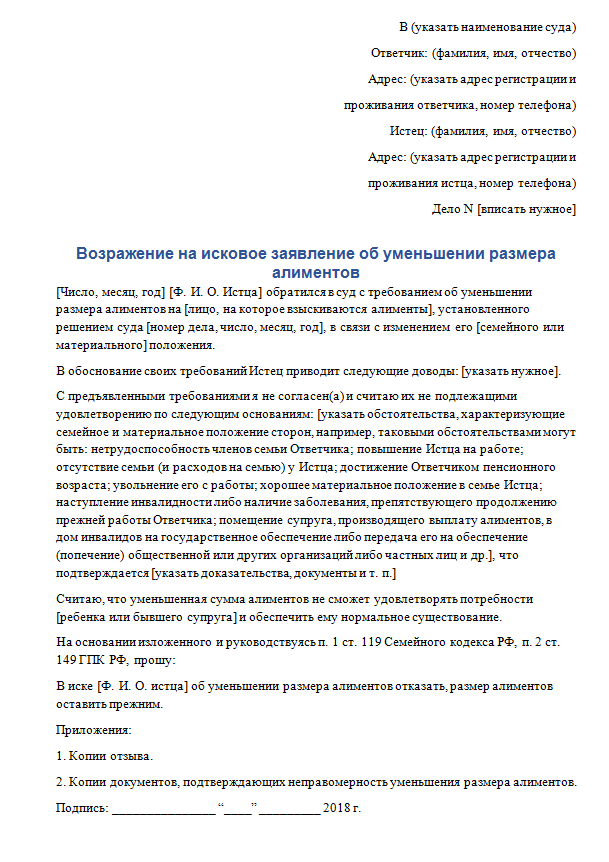
Judicial practice
Case No. 2-655/2016 of the Savelov District Court of Moscow.
The plaintiff, Mr. G., filed a claim for a reduction in maintenance, and the defendant, his ex-wife, Catherine G., filed an objection in which she expressed her disagreement with the ex-wife ' s claims, without raising any objections or grounds for rebuttal.
The plaintiff, on the other hand, justified the existence of a disability group (group II) and a severe reduction in the material situation, as well as the fact that the elderly mother and the disabled child were dependent, and the court reduced the alimony by half and the defendant ' s position was simply taken into account.

An example of a situation where an objection to a reduction in maintenance literally "saved" the case has been dealt with above: the jurisprudence in each case of reduction of maintenance is very mixed and depends much on the reasoned arguments of each party; it is better to assign such a category of cases to experienced lawyers without allowing for independent and sometimes very ineffective protection of rights.
We need a lawyer.
The formulation of a reasoned objection requires the participation of a family lawyer; our specialists will not only provide free advice but will also assist in the drafting of documents if necessary.
How can an application for reduction of maintenance be drafted and challenged?

Maintenances are payments that one spouse is obliged to pay to the other if he or she is not involved in the upbringing of the child; they are generally appointed by the court on the basis of the current financial position of the payer, taking into account various financial factors, and the payments may be very large and take up most of the earnings.
But sometimes the financial position of the payer is changed to a large extent and the court ' s fixed amounts become impossible, in which case only an application for relief can help.
It may change the amount of the payment to a more reasonable one, but the application is often wrongfully and without foundation, and a form of objection is specifically provided for in such cases.
That is what we will discuss in our article.
Reasons for reduction and grounds for refusal
First of all, a list of grounds should be established to enable the payer to file a claim for a reduction in maintenance.These include the following factors::
- A severe deterioration in health;
- Loss of capacity to work;
- Deterioration of the financial situation;
- Diseases of family members;
- A sharp improvement in the financial position of the recipient;
- Full coverage of the needs of the recipient of maintenance by the State.
All these reasons may allow the payer to pay less maintenance, but they are not a guarantee.You may avail yourself of the following grounds:
- The amount of maintenance, once reduced, will not ensure the child ' s needs;
- The child requires medical care and additional paid care;
- Maintenance is required not only for the child but also for the parent who is raising him;
- The deterioration of the payer ' s financial condition or the improvement of the recipient ' s position is insignificant and does not affect the child ' s welfare and upbringing;
- Once the payments have been reduced, they will not be in accordance with the minimum possible standards.
How is it made?
To object to a claim for reduction of maintenance is simple enough to simply follow a certain form:
HeadingIt is written in the upper right part of the A4 page. It requires that:
- Data from the court in which the claim for reduction of maintenance payments was filed;
- Information on the applicant - respondent: FIO, registration address;
- Information on the plaintiff: FIO, registration address;
- Information on the reduction of maintenance (number and date).
Information sectionIt contains the objection itself and must be written in it;
- Information on the action filed;
- Information on the case on which the award of maintenance was ordered;
- A list of the reasons why alimony should not be reduced;
- Detailed reasons.
Final partProvides additional information on the case under consideration, as well as three mandatory paragraphs:
- List of documents that may confirm the information you have provided;
- Signature of applicant;
- Date of application to the court.
As you can see, it is much easier to formulate an objection than a claim, because it implies some freedom in setting out your grounds for refusal, so you may well provide additional information, such as delays, information on the applicant ' s participation in the child ' s upbringing, data on the material situation of each party.
What do we do next with the application?
As soon as your objection to an application for a reduction in the amount of maintenance is ready to be submitted to the court, it is desirable that it be filed at the time when the proceedings are known to have commenced.
Council
However, it is not enough for you to make an objection; you will also need to make your case clear, so if you refer to the child's difficult state of health, you will need to provide a medical certificate to record your illness; if your application is accepted and well-founded, the plaintiff will be returned; otherwise, we recommend that you hire a lawyer and prepare a case for the defence of your interests during a full trial.
Model of an objection to a claim for reduction of maintenance
A civil case No. 2-466/17 in the FIO1 suit against FIO2 for changing the amount of maintenance is pending before the Magistrate of Judicial Station No. 7 of the October District of Samara Samara Region.
The defendant, with the arguments set forth in the statement of claim, disagrees, considers them to be based on misinterpretation of the law and contrary to the factual circumstances of the dispute under consideration, on the following grounds:
Under article 119, paragraph 1, of the Criminal Code, if, in the absence of an agreement on the payment of maintenance following a court determination of the amount of maintenance, the material or family status of one of the parties has changed, the court is entitled, at the request of either party, to change the amount of maintenance or to exempt the person liable to pay the maintenance from payment, and the court is also entitled to take into account the other relevant interest of the parties when changing the amount of maintenance or granting it.
In accordance with paragraph 14 of Decision No. 9 of 25 October 1996 of the Plenum of the Supreme Court of the Russian Federation on the application by the courts of the Family Code of the Russian Federation in cases involving the establishment of paternity and the recovery of maintenance, in determining the amount of maintenance to be paid by a parent to minor children (art. 81, para. 2, of the Russian Federation), in changing the amount of maintenance or exempting them from payment (art. 119, para. 1, of the UK), the court takes into account the material and family situation of the parties, as well as other noteworthy circumstances or interests of the parties (e.g. the incapacity of family members to whom the party is legally obliged to bring maintenance, disability or illness preventing the child from continuing his or her previous employment, entering or engaging in business activities).
In support of his claim, the plaintiff refers to the fact that he entered into a new marriage with the FIO3 and that the plaintiff had a second child, the FIO4.
Reviewing case law in cases involving the recovery of maintenance for minor children, as well as for disabled adult children" (up to 13.05.15) states that the existence of a dependant on maintenance payments for other children in respect of whom the issue of the judicial recovery of maintenance has not been resolved is not an unconditional reason for the courts to change the amount of maintenance.
In addition, during the court hearing, the plaintiff explained that he lived with his wife and daughter, ran a joint household and had a total budget.
The distribution of the burden of proof in claims for maintenance is of a general nature, as provided for in article 56 of the Code of Criminal Procedure.
The person who has requested a change in the amount of maintenance to be recovered has the obligation to prove the circumstances that justify the reduction of the penalty.
However, the plaintiff did not provide the court with evidence to prove the lack of financial support for the family by justifying his claims for the birth of a second child.
Objection to claim for reduction of child support: model document
Maintenance of minor children is one of the primary parental responsibilities.
When a marriage is dissolved, a parent living separately from his or her child undertakes to pay alimony to him or her second parent.
In some cases, the amount of maintenance may be reduced. How can the payer reduce maintenance payments and how can the beneficiary prevent this?
Reasons for reducing alimony payments
The Family Code of the Russian Federation provides for the payment of alimony to minors who, after divorce, live separately from the payer; the law establishes the amount of material assistance, which is as follows:
- 25 per cent of the wage per child;
- 33 per cent of income per 2 children;
- 50% of the salary for three or more children.
Maintenance may be reduced on the following grounds:
- The reason is to give birth to a child in a new family. If a child has a child from a previous marriage, he is entitled to a payment of 25 per cent. When two children (and two children are assisted by 33 per cent), the child ' s maintenance is reduced to 16 per cent.
- A minor has an income that makes him fully self-sufficient; from the age of 16, a citizen has the right to engage in business or to be officially employed.
- Deterioration of the payer ' s living conditions: a parent may lose his or her job or, due to disability, be unable to pay the amount previously appointed.
- Transfer of the minor to another person; if the mother ' s new spouse adopts him, the ex-husband is exempted from parental duties.
In order for the court to consider the reduction of maintenance payments, the payer submits the claim to the court (see also the model application for the cancellation of maintenance) and must be provided with strong, documented evidence of the grounds for the reduction of maintenance.
The defendant is the second parent living with the children, and the document summarizes the circumstances and explains why the court should reduce the financial assistance to the minor; the application should be accompanied by a list of documents documenting the reasons for the reduction.
Grounds for refusal to reduce maintenance
When filing an application, it should be borne in mind that the court is not obliged to satisfy the plaintiff ' s requirements; during the trial, a full review of the case takes place in which the documents submitted are carefully examined; the refusal may take place at the stage of acceptance for the following reasons:
- Errors in completing the statement of claim;
- Incorrect jurisdiction;
- Lack of evidence.
Such errors can be corrected and tried again; it is much more difficult to appeal the case if the decision has proved to be negative as a result of the proceedings; if the court has refused to grant the plaintiff ' s application, it has 10 days to expand the evidence base and appeal; if the plaintiff ' s rights have been violated, it must lodge an appeal in cassation.
The court may reject the application on the grounds that the evidence is unconvincing; a second party may provide arguments as to why the minor needs the same amount of payment (e.g. a child ' s state of health certificate, which requires additional assistance for treatment).
The reasons for refusal may be the concealment of wages and the availability of additional income from the payer; some of the grounds for opening the proceedings may not be sufficient if the plaintiff provides them only, without additional reasons.
A minor ' s inheritance of property that does not generate income can only be an additional reason for reducing maintenance, not the main reason.
The reason for reducing maintenance cannot be an increase in the income of the second parent or the child ' s receipt of benefits and pensions.
The statement of claim must contain information on the number of the original claim in the cap and also include information on the plaintiff and defendant, as well as the name of the judicial authority to which the application is sent.
Objection to a claim for reduction of payments
For many mothers living with their children, the news of a reduction in maintenance becomes an unpleasant surprise (recommend us to read: What if the former husband filed a reduction in maintenance?).
The amount of the payment is small and the child's maintenance is a significant part of the family's expenses, and a reduction in the amount of alimony payments will mean that the child will have to be limited in food, clothing or other benefits.
The mother often considers the action to be unlawful and has the right to prepare objections in court.
Reasons for objection
In order to challenge the need to reduce maintenance in court, the recipient would have to provide evidence or refute the plaintiff ' s words by proving that they were false.
- The improper performance of parental responsibilities by the payer is the late payment of maintenance, insufficient participation in the child's life;
- Evidence of the claimant ' s concealment of income;
- The need for expenditure on treatment or education;
- The difficult material situation of the parent with whom the minor lives.
There is not enough reason to object; as much evidence as possible will have to be gathered in order to defend its point of view; written testimony, checks and receipts of necessary expenses, income statements, medical reports on the minor ' s health may be provided as documentary evidence.
Model document
An objection to a statement of claim shall be made in writing in two copies, one of which shall be transmitted to the Registry of the Court and the other to the respondent.
The filling style is an official business style and is not allowed to use conversational jargon. The statement should briefly describe the situation and set out its requirements.
It is not appropriate to list facts that are irrelevant or to make an assessment of what is happening.
The model of the document is as follows:
A list of the attached documents is required at the end; these documents constitute the evidence on which the court will base its decision; such proceedings are not subject to a State duty.
Examples of jurisprudence
As the case law shows, the court does not always grant a reduction in maintenance; consider the following situation: a citizen of N. filed a claim for a reduction in maintenance payments on the grounds that his 16-year-old son has his own income.
In the course of the trial, it became clear that the minor ' s income was not regular and small, but that he spent his own education on money derived from his work.
The child was still in need of material assistance from the parents, so the court did not grant the father ' s claim.
In another situation, citizen A. filed an application with the court to cancel maintenance payments, arguing that his income had decreased and that he needed to provide for retired parents.
The mother of the minor, a citizen of S., filed a counter-claim for increased maintenance payments.
She attributed her position to the chronic illness of a child who needed medication, regular procedures and rehabilitation.
She also provided evidence that the father, apart from financial assistance, was no longer involved in or interested in the child ' s life.
During the trial, doubts arose as to the real decline in the income of citizen A. It was established that he simply transferred part of his earnings to a "grey" salary.
The court not only refused to grant the defendant ' s claim, but increased the alimony payments, given the hidden portion of the income.
However, there are cases in which the court takes the plaintiff's side. Consider another example of practice.
Asked the court to reduce alimony due to the birth of a second child in a new family (detailed in the article: reduction of maintenance for the birth of a second child in a new marriage).
There was no reason to increase the payment for the first child; his mother ' s income did not change; his health was in order; the court granted the plaintiff ' s application and reduced the payment to take into account the need to provide for the newborn and his mother.
The court proceedings relating to the reduction or increase of maintenance are always ambiguous and complex; in order to be sure of the court ' s satisfaction, a competent lawyer should be contacted; a specialist will help to gather evidence and prepare the necessary documents and will present the case to the court.







